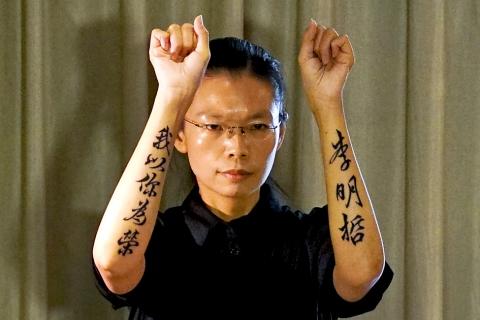Taiwanese human rights advocate Lee Ming-che (李明哲) yesterday confessed in a court in China to attempting to subvert the Chinese government, according to videos of his trial released by Chinese authorities, although his wife refused to recognize the court’s authority.
Lee, a community college teacher known for his pro-democracy and rights activism, went missing after entering China on March 19.
Chinese authorities later confirmed that he was being investigated on suspicion of damaging national security.

Photo: AP
Lee said that he accepted the charge of subversion and expressed regret in videos of his comments released on social media by the Yueyang City Intermediate People’s Court in Yueyang, Hunan Province.
“I spread some attacks, theories that maliciously attacked and defamed the Chinese government, the Chinese Communist Party and China’s current political system, and I incited the subversion of state power,” Lee said, referring to comments written in an instant messaging group.
Lee stood trial alongside Chinese national Peng Yuhua (彭宇華), 37, who confessed to creating instant messaging groups and founding an organization that sought to promote political change in China.
Lee had been involved in both, Peng said in testimony released on video by the court.
Judicial Reform Foundation executive secretary Hsiao Yi-ming (蕭逸民) traveled to China for the trial, but said he was barred from entering the courtroom.
Hsiao suspected Peng was being used by authorities to help strengthen the state’s case against Lee, as he was unaware of any previous connection between the two men.
“We contacted a lot of Lee’s friends in China, but no one has ever heard of Peng Yuhua,” Hsiao told reporters by telephone.
Lee’s wife, Lee Ching-yu (李凈瑜), attended the hearing.
Before leaving for China she had asked that Lee Ming-che’s supporters forgive him for anything he might say during the hearing that disappoints them.
She wrote a letter to her husband yesterday morning before the trial began, photographs of which were seen by reporters.
“I do not recognize this court. I also did not hire any lawyers,” she wrote.
No one answered the court telephone when called by reporters yesterday.
Releasing videos and transcripts of court hearings has become increasingly common in China as part of a push for greater judicial transparency and oversight.
However, rights activists said that in sensitive cases holding “open” trials allows authorities to demonstrate state power and deter others, with statements and verdicts usually agreed in advance.

The CIA has a message for Chinese government officials worried about their place in Chinese President Xi Jinping’s (習近平) government: Come work with us. The agency released two Mandarin-language videos on social media on Thursday inviting disgruntled officials to contact the CIA. The recruitment videos posted on YouTube and X racked up more than 5 million views combined in their first day. The outreach comes as CIA Director John Ratcliffe has vowed to boost the agency’s use of intelligence from human sources and its focus on China, which has recently targeted US officials with its own espionage operations. The videos are “aimed at

STEADFAST FRIEND: The bills encourage increased Taiwan-US engagement and address China’s distortion of UN Resolution 2758 to isolate Taiwan internationally The Presidential Office yesterday thanked the US House of Representatives for unanimously passing two Taiwan-related bills highlighting its solid support for Taiwan’s democracy and global participation, and for deepening bilateral relations. One of the bills, the Taiwan Assurance Implementation Act, requires the US Department of State to periodically review its guidelines for engagement with Taiwan, and report to the US Congress on the guidelines and plans to lift self-imposed limitations on US-Taiwan engagement. The other bill is the Taiwan International Solidarity Act, which clarifies that UN Resolution 2758 does not address the issue of the representation of Taiwan or its people in

US Indo-Pacific Commander Admiral Samuel Paparo on Friday expressed concern over the rate at which China is diversifying its military exercises, the Financial Times (FT) reported on Saturday. “The rates of change on the depth and breadth of their exercises is the one non-linear effect that I’ve seen in the last year that wakes me up at night or keeps me up at night,” Paparo was quoted by FT as saying while attending the annual Sedona Forum at the McCain Institute in Arizona. Paparo also expressed concern over the speed with which China was expanding its military. While the US

SHIFT: Taiwan’s better-than-expected first-quarter GDP and signs of weakness in the US have driven global capital back to emerging markets, the central bank head said The central bank yesterday blamed market speculation for the steep rise in the local currency, and urged exporters and financial institutions to stay calm and stop panic sell-offs to avoid hurting their own profitability. The nation’s top monetary policymaker said that it would step in, if necessary, to maintain order and stability in the foreign exchange market. The remarks came as the NT dollar yesterday closed up NT$0.919 to NT$30.145 against the US dollar in Taipei trading, after rising as high as NT$29.59 in intraday trading. The local currency has surged 5.85 percent against the greenback over the past two sessions, central